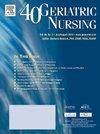“Bringing them back”: Perspectives of staff and volunteers on dementia care using SAIDO learning©
IF 2.5
3区 医学
Q3 GERIATRICS & GERONTOLOGY
引用次数: 0
Abstract
As the number of people with dementia increase, an additional 1.2 million direct care workers will be required for their care by 2030. As innovative approaches to dementia care continue to emerge, it remains essential that caregivers’ thoughts and perspectives are considered. Participants in our study shared their observations of positive changes among residents living with dementia after implementation of SAIDO Learning©. This is the first study to explore staff/volunteer insight on this non-pharmacological, cognitive intervention. A qualitative, descriptive study was conducted to explore staff and volunteer thoughts, feelings, and perceptions as providers of a non-pharmacologic intervention (SAIDO Learning©) for persons living with dementia. Three themes emerged: Changes in residents, culture within the retirement community, and building relationships with residents. Globally, as the population ages, this research is critical within the field of nursing as it will expand our knowledge and delivery of nursing care for clients living with dementia.
“带他们回来”:工作人员和志愿者使用SAIDO学习对痴呆症护理的看法©
随着痴呆症患者人数的增加,到2030年将需要额外的120万名直接护理人员来照顾他们。随着痴呆症护理的创新方法不断出现,考虑照顾者的想法和观点仍然至关重要。我们研究的参与者分享了他们在实施SAIDO学习©后对痴呆症患者的积极变化的观察。这是第一个探索员工/志愿者对这种非药物认知干预的见解的研究。进行了一项定性描述性研究,以探索作为痴呆症患者非药物干预(SAIDO Learning©)提供者的工作人员和志愿者的想法、感受和看法。三个主题出现了:居民的变化,退休社区的文化,以及与居民建立关系。在全球范围内,随着人口老龄化,这项研究在护理领域至关重要,因为它将扩大我们的知识和为痴呆症患者提供护理服务。
本文章由计算机程序翻译,如有差异,请以英文原文为准。
求助全文
约1分钟内获得全文
求助全文
来源期刊

Geriatric Nursing
医学-护理
CiteScore
3.80
自引率
7.40%
发文量
257
审稿时长
>12 weeks
期刊介绍:
Geriatric Nursing is a comprehensive source for clinical information and management advice relating to the care of older adults. The journal''s peer-reviewed articles report the latest developments in the management of acute and chronic disorders and provide practical advice on care of older adults across the long term continuum. Geriatric Nursing addresses current issues related to drugs, advance directives, staff development and management, legal issues, client and caregiver education, infection control, and other topics. The journal is written specifically for nurses and nurse practitioners who work with older adults in any care setting.
 求助内容:
求助内容: 应助结果提醒方式:
应助结果提醒方式:


